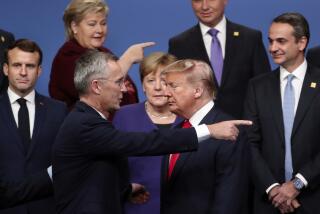Support Wanes for Turk Raids on Kurd Rebels : Military: U.S., European allies warn Ankara that incursion into Iraq is taking too long, hurting civilians.
- Share via
WASHINGTON — Turkey’s allies in Europe and the United States are growing impatient with Ankara’s military incursion into northern Iraq, an operation that was billed as a quick raid against terrorist bases but that has now stretched into its second week with no end in sight.
The Clinton Administration, which originally appeared to support Turkish efforts to stop Kurdish separatists from using Iraqi territory to launch terrorist attacks against Turkey, has begun complaining about the operation’s length and the civilian suffering that it is causing.
Secretary of State Warren Christopher said the U.S. government has warned Turkish officials bluntly that “we are concerned about the passage of time and concerned about reports that we had with respect to human rights violations. . . . We told them that we thought the support of the United States and the international community would be forthcoming only if the troops were promptly withdrawn.”
In Europe, the criticism is even more pointed. Danish Foreign Minister Niels Helveg Petersen, in Washington this week, said: “The Turkish action is in violation of the territorial integrity of a foreign state and, therefore, we find that unacceptable.”
*
Turkey began the invasion March 20, explaining that it was intended to wipe out bases of the Kurdish Workers Party, or PKK.
A government statement said PKK camps were used for terrorist activities “including massacres against the civilian population in Turkey.”
The Turkish government conceded that its operation is taking place on territory that is legally part of Iraq. But, echoing arguments that Israel has used to justify occupying southern Lebanon for more than a decade, Turkey said Iraq is unable to “exercise its sovereignty” in the region, which has become a “safe haven” for terrorists.
Under those circumstances, the Turkish government said, international law permits “military action of limited duration” to protect the Turkish side of the border.
It is true the Iraqi government has lost control of the northern part of the country. This is so because the United States and its Persian Gulf War allies, including Turkey, declared the zone a “protected area” for Kurds and told the Iraqi government to leave it alone.
The protection was intended to prevent Iraqi President Saddam Hussein’s regime from oppressing the Kurds, nominally Iraqi citizens.
But the PKK--which is dominated by Kurds with nominal Turkish citizenship--is also based in the area.
Kurds, probably the largest national group without a sovereign homeland, inhabit the mountainous region covering parts of Iraq, Iran, Turkey and Syria.
Rosemary Hollis, the senior Middle East expert at the Royal Institute of International Affairs in London, said the West will find it difficult to keep enforcing a “no-fly” zone to protect Kurds from the Iraqi air force if it stands aside and lets Turkish pilots attack the region.
“We’re losing (the good will of) a whole generation of Iraqis with this action,” she said.
The longer Turkey, a member of the North Atlantic Treaty Organization, stays in the Kurdish region, the harder it will become for other NATO nations to maintain their prohibitions on Iraqi troops operating in a part of their own country.
Germany, which has Turkish and Kurdish minorities and has sold arms to Turkey, has been the most outspoken European nation on the issue, although most members of the European Union have been critical.
German Foreign Minister Klaus Kinkel on Monday called for a quick withdrawal of Turkish forces as the government in Bonn moved to suspend $100 million in subsidies granted to Turkey for the purchase of two naval frigates now under construction in German shipyards. An exasperated Chancellor Helmut Kohl also reminded the Ankara government that, as a member of NATO, Turkey was part of a “community of shared values.”
In Brussels, European Union officials have talked about delaying ratification of a recently signed customs union accord with Ankara, but so far there has been no concrete step in this direction.
The U.S. government supports Turkey’s deal with the EU as a step toward greater stability in Europe, giving Washington more reason to urge Ankara to end its incursion.
For the Clinton Administration, the controversy is embarrassing because it seems to confirm criticism that Washington trims its human rights policy to suit other concerns, giving far more slack to its friends than to other nations.
“The Turks have been pretty good allies of the United States over the years in terms of helping contain the Soviets in the Black Sea, giving us intelligence facilities and doing other things,” said Helmut Sonnenfeldt, a former European affairs expert for the State Department and the National Security Council. “So we’ve had to develop a double standard on human rights.”
Kempster reported from Washington and Marshall from Berlin.
More to Read
Sign up for Essential California
The most important California stories and recommendations in your inbox every morning.
You may occasionally receive promotional content from the Los Angeles Times.











